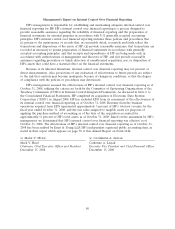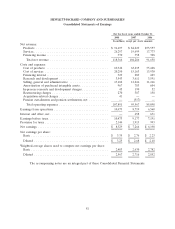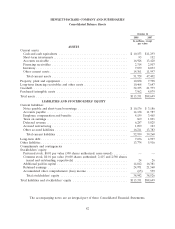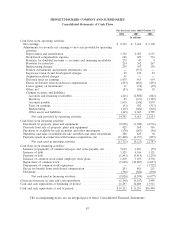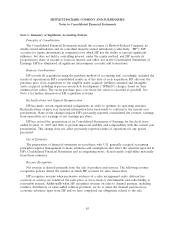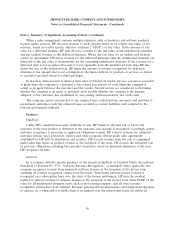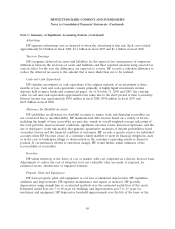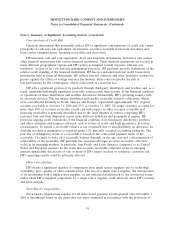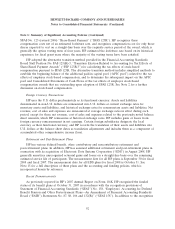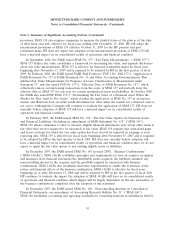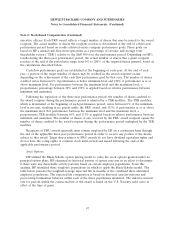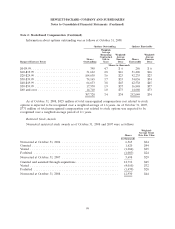HP 2008 Annual Report Download - page 95
Download and view the complete annual report
Please find page 95 of the 2008 HP annual report below. You can navigate through the pages in the report by either clicking on the pages listed below, or by using the keyword search tool below to find specific information within the annual report.HEWLETT-PACKARD COMPANY AND SUBSIDIARIES
Notes to Consolidated Financial Statements (Continued)
Note 1: Summary of Significant Accounting Policies (Continued)
asset, whichever is shorter. HP depreciates equipment held for lease over the initial term of the lease
to the equipment’s estimated residual value.
HP capitalizes certain internal and external costs incurred to acquire or create internal use
software, principally related to software coding, designing system interfaces and installation and testing
of the software. HP amortizes capitalized costs using the straight-line method over the estimated useful
lives of the software, generally from three to five years.
Goodwill and Indefinite-Lived Purchased Intangible Assets
Statement of Financial Accounting Standards (‘‘SFAS’’) No. 142, ‘‘Goodwill and Other Intangible
Assets’’ (‘‘SFAS 142’’), prohibits the amortization of goodwill and purchased intangible assets with
indefinite useful lives. HP reviews goodwill and purchased intangible assets with indefinite lives for
impairment annually at the beginning of its fourth fiscal quarter and whenever events or changes in
circumstances indicate the carrying value of an asset may not be recoverable in accordance with
SFAS 142. For goodwill, HP performs a two-step impairment test. In the first step, HP compares the
fair value of each reporting unit to its carrying value. Our reporting units are consistent with the
reportable segments identified in Note 18. HP determines the fair value of its reporting units based on
a weighting of income and market approaches. Under the income approach, HP calculates the fair
value of a reporting unit based on the present value of estimated future cash flows. Under the market
approach, HP estimates the fair value based on market multiples of revenue or earnings for
comparable companies. If the fair value of the reporting unit exceeds the carrying value of the net
assets assigned to that unit, goodwill is not impaired and no further testing is performed. If the carrying
value of the net assets assigned to the reporting unit exceeds the fair value of the reporting unit, then
HP must perform the second step of the impairment test in order to determine the implied fair value
of the reporting unit’s goodwill. If the carrying value of a reporting unit’s goodwill exceeds its implied
fair value, HP records an impairment loss equal to the difference.
SFAS 142 also requires that the fair value of the indefinite-lived purchased intangible assets be
estimated and compared to the carrying value. HP estimates the fair value of these intangible assets
using an income approach. HP recognizes an impairment loss when the estimated fair value of the
indefinite-lived purchased intangible assets is less than the carrying value.
Long-Lived Assets Including Finite-Lived Purchased Intangible Assets
HP amortizes purchased intangible assets with finite lives using the straight-line method over the
estimated economic lives of the assets, ranging from one to ten years.
HP evaluates long-lived assets, such as property, plant and equipment and purchased intangible
assets with finite lives, for impairment whenever events or changes in circumstances indicate the
carrying value of an asset may not be recoverable in accordance with SFAS No. 144, ‘‘Accounting for
the Impairment or Disposal of Long-Lived Assets.’’ HP assesses the fair value of the assets based on
the undiscounted future cash flow the assets are expected to generate and recognizes an impairment
loss when estimated undiscounted future cash flow expected to result from the use of the asset plus net
proceeds expected from disposition of the asset, if any, are less than the carrying value of the asset.
When HP identifies an impairment, HP reduces the carrying amount of the asset to its estimated fair
value based on a discounted cash flow approach or, when available and appropriate, to comparable
market values.
89



